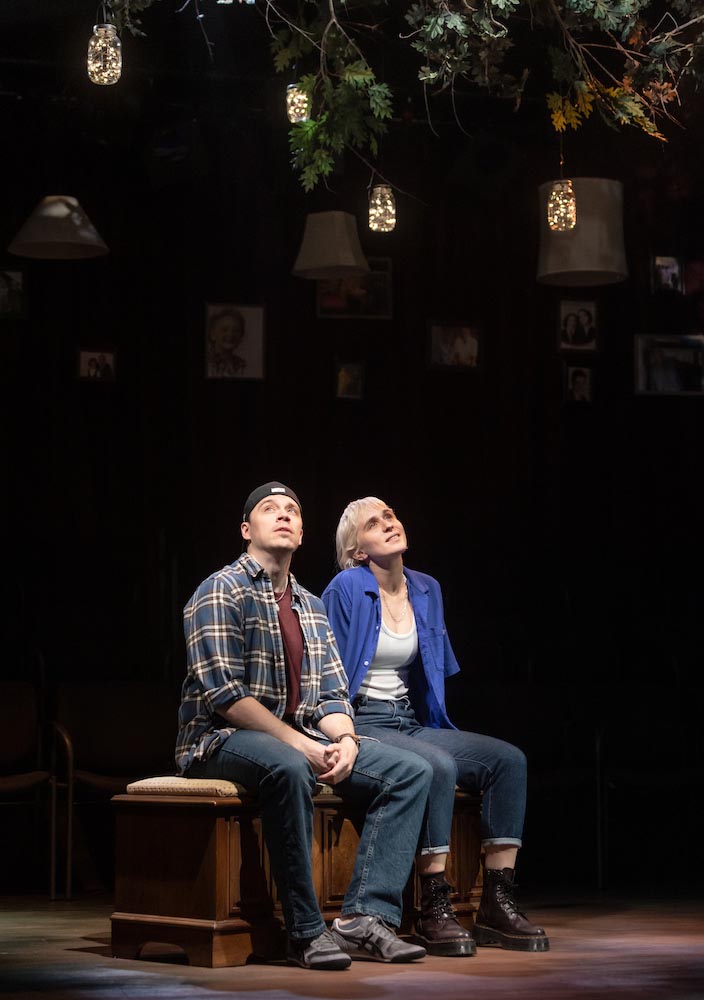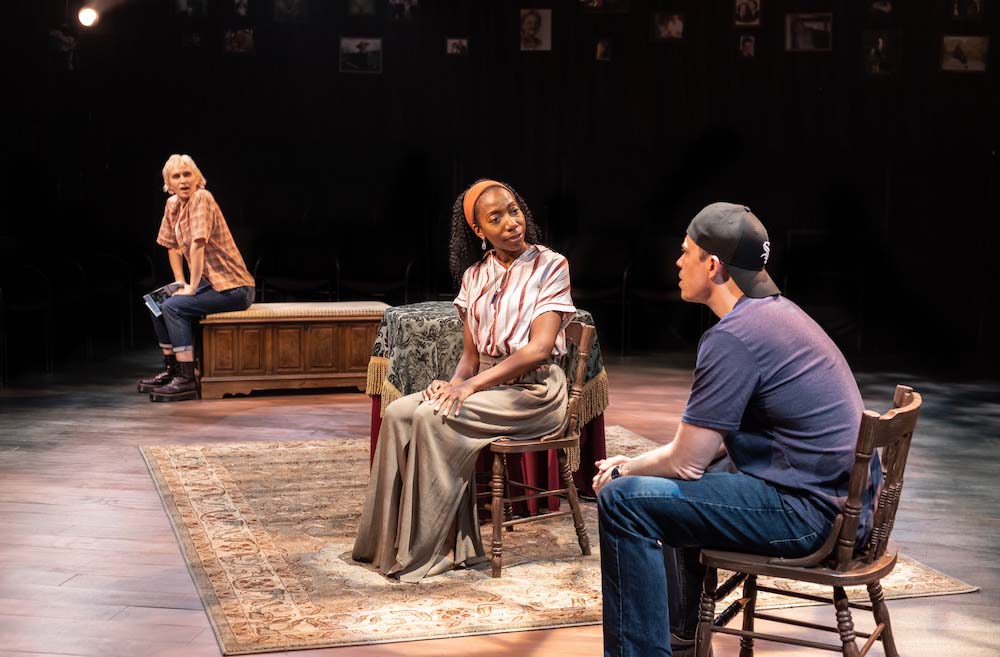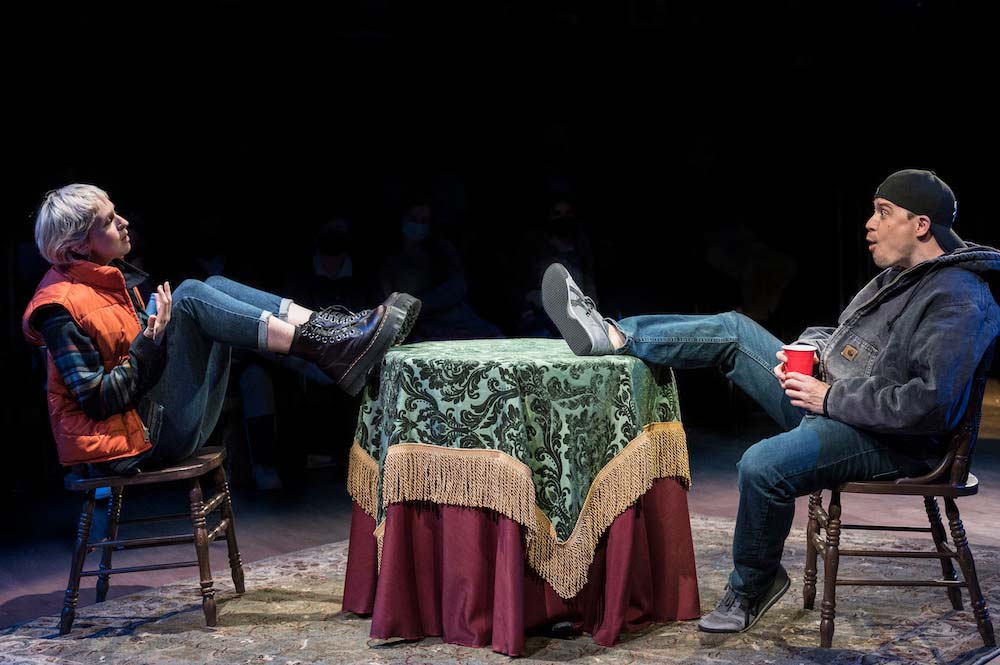Can you imagine a warmly funny and sweetly moving play full of spirit and uplift that was precipitated by COVID? I sure couldn’t. (Too soon, right?) But playwright Chelsea Marcantel sure did, in her poignant new play The Upstairs Room now premiering at Signature Theatre.
What I knew about Chelsea Marcantel going in was that she’s a genius at creating worlds on stage that seem fantastical and fictitious but that are situated in a world that actually exists. That’s what she did with Airness, which she set in the world of competitive air-guitar, a kind of axe karaoke where contestants shred the air fiercely to a blasting soundtrack. (Who knew that was a thing?) Marcantel took me to that world, peopled it with characters I could care about, and got my disbelief not just suspended but dissolved.
And what I knew going into The Upstairs Department was that it would be set somewhere else anomalous, for Marcantel was going to take me inside the world of the Spiritualist movement, which some call a religion. Its adherents believe that the dead are not dead, they’ve just “moved upstairs,” and they can be communicated with. Believers mean this literally: the living can talk to the dead and vice versa. (It’s “Can you hear me now?” with no phone.) This faith’s U.S. epicenter is a real place, a hamlet in southwestern New York State called Lily Dale, to which each year tens of thousands of the bereaved travel for a healing reconnection with a loved one.
To me, all that “I hear dead people” stuff had sounded even more woo-woo than that other weird world where rockers fake-play invisible guitars. Was I going to buy it? I had no idea. But I did find it curious that both Airness and Upstairs Department share an affinity for “things unseen” — or as the Apostle Paul put it:
And so we have no eyes for things that are visible, but only for things that are invisible; for visible things last only for a time, and the invisible things are eternal. (II Corinthians 4:18, JB)
And what better medium than theater for building belief in the presence of absence?

So back to The Upstairs Department’s connection to COVID — something we’ve seen too much of in this life and something we likely won’t unsee for the foreseeable future. Though the play can be gently touching, deeply satisfying, even lighthearted, its backstory is decidedly grim: A father and a son contracted COVID during the early days of the pandemic. They were both hospitalized. The son was put into a medically induced coma for a month. Just before he came to, his dad died. And the son, named Luke, cannot bear not being able to communicate with his beloved father one more time.
As it happened, when Luke got out of the coma he was changed, from “old Luke” to “new Luke”: He began hearing people from the other side say things, strangers who did not really die, voices when no one was there. Would it be possible, Luke wonders, that he could hear from his dad as well?
Thus Luke (a very credibly credulous Zach Livingston) and his sister, Colleen (an enthralling Annie Grove), take a car trip to Lily Dale. There they meet a medium, Shiloh (the imposingly attuned Joy Jones), who shows them the ways of the afterlife world.

Marcantel has written into the character of Colleen plenty of skepticism, enough to identify with if you’re so inclined. And I was so inclined. I knew I was going to have to commit to the play’s premise (“the dead are not dead”) and just go with it — a not uncommon juncture in my theatergoing, though not typically this arational — or else I would mentally check out.
Certainly, some splendid stage arts were arrayed to support my seeking and transport me into this space of mysterious wishing for immortality: There were leafy branches above from which hung Mason jars with fireflies inside, and center stage in this enchanting bower was a patterned carpet and a table set for a seance (scenic design by Page Hathaway). On the four surrounding walls were framed photographs of faces of people who presumably had passed, and an assortment of lampshades ringed the stage — all of which between scenes were animated by flickering illumination as if in some spirit realm (lighting design by Annie Wiegand) while otherworldly meditation music suffused the atmosphere (sound design by Kenny Neal).
But at some point, my relation to the play shifted from skepticism to connection. Instead of mulling whether I could bring myself to believe in unseen spirits, I found myself paying close attention to Luke and Colleen’s evolving brother-sister relationship — which as written and as played I found beautiful and heartfelt beyond words.

Apart from Luke’s newfound capacity to hear dead people, he’s kind of a typical straight white dude (costumed aptly as such by Ivania Stack). But Colleen is not typical anything. She’s a lesbian who identifies as genderqueer, dresses boyishly, has close-cropped hair (and Stack shows us exactly what would be in Colleen’s closet). We see the sibs, pre-COVID and pre-coma, drinking together and having hella fun, but it’s more the kind of raucous rapport that guys have. In a real sense, Luke and Colleen, both in baseball caps, banter and behave as bros. They tease each other as siblings do — and the tension between his belief and her skepticism is real — but there is a best-buddy bond between them that under Holly Twyford’s exquisitely sensitive direction we see steadily grow stronger in a genuinely surprising and moving way.
I honestly don’t want to give away any more story points except to pass on this tip: Worry not about the woo-woo; you can take that or leave it. But keep your eyes on the brother-sister relationship. Especially if you were ever in one, it makes the play a healing balm.
Running Time: 90 minutes, with no intermission.
The Upstairs Department plays through June 12, 2022, in the ARC at Signature Theatre – 4200 Campbell Avenue in Arlington, VA. For tickets ($40–$108), call (703) 820-9771 or purchase online. Information about ticket discounts is available here.
The program for The Upstairs Department is available online here.
COVID Safety: Signature Theatre requires all audiences to provide proof of vaccination and wear a mask to attend all live public performances and events at indoor venues. Signature’s COVID safety plans can be found here.
Closed captions for The Upstairs Department will be available for every show via the GalaPro app.




